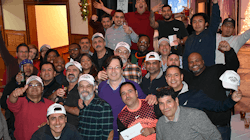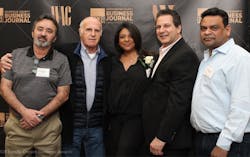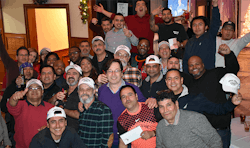HVAC & COVID: AMHAC Field and Office Teams Step Up at NY's 'Ground Zero'
The team at All Makes Heating and Cooling (AMHAC) of Eastchester, NY, has given it their all, in the center of the nation’s COVID-19 infestation, New York City. The company’s reputation, field and office teamwork and experienced leadership contributed to its success as it worked through a drastic change in business operations.
AMHAC has a 65-year history of excellent service for customers in Manhattan townhouses as well as residences in Westchester and Fairfield Counties, and Riverdale, Bronx. In February, AMHAC was named a top family business for 2020 by the Fairfield Country Business Journal and WAG Magazine.
Natalie Lloyd, general manager and director of marketing, has been with AMHAC for 10 years. She joined after earning a business degree from Rutgers University, and was soon learning all she could about the inner workings and strategies of a leading HVAC service and installation business. She learned dispatching, office management, and went on sales calls with the sales team.
“They knew I wanted to learn, and I obtained a broad overview of the company and its inner workings.”
“What made me successful, was that I was able to reduce the number of communication channels. I saw how everyone interacted and was able to centralize things better, in a way that empowered people to make their own decisions faster,” Lloyd says.
AMHAC provides electrical and sheet metal services which makes each team capable to respond to a variety of service and installation needs.
“The homes are not quick, one unit maintenance calls. Some have six air conditioners, geothermal systems and many controls. Our residential technicians have two years of training because of the homes we serve,” Lloyd says.
AMHAC also provides electrical and sheet metal services, which Lloyd says, which makes each team capable to respond to a variety of service and installation needs.
“We really believe in cross-training, so our service technicians were also able to handle small installation jobs, so if for some reason an emergency repair was needed, a service tech could get it done.We’ve been trying to eliminate the labels of ‘service technician’ and ‘installer,’ and have everyone be known as ‘an AMHAC technician.’ They work wherever they’re needed. That was a big rationale for paying them for 40-hour weeks; we were using them wherever they were needed.”
“We split our clientele between New York City and Westchester. Buildings housing our accounts in New York City began to close, and superintendents stopped us from going into those buildings. We did have some clients living in smaller buildings with private access. We were able to complete emergency replacements or work outdoors on rooftops. For the most part, the city was shut down.”
Building superintendents were taking care of minor repairs, but major construction sites where AMHAC was installing new systems were also closed.
“A lot of people just completely stopped calling. We got in touch with some of the superintendents and they said there was no need for anything; this was just in the city,” Lloyd explains.
“We were proactive. We issued an email press release during the second week in March, to 5,000 customers, and our CSRs stayed in touch with customers by phone. We kept CSRs on full time. They were constantly calling people to let them know we were available,” Lloyd says.
With city work closed, AMHAC devoted its full attention to residential accounts in Westchester, Fairfield and Riverdale.
“We were proactive. We issued an email press release during the second week in March, to 5,000 customers, and our CSRs stayed in touch with customers by phone. We kept CSRs on full time. They were constantly calling people to let them know we were available,” Lloyd says.
“We had also premailed our service contract customers about three months in advance. So the March, April and May contract notifications were sent. Just so we can have communication, along with the letter stating that we are an essential business, that we had full service and installation teams ready should they need help. We wanted to tell them we were essential and here for them, but also to market, in a responsible way, indoor air quality, which is something we specialize in.”
Later, AMHAC took part in a Workshare program once Governor Cuomo declared that all “non-essential” workers must work from home, as those businesses became closed to in-person customers.
“We wanted to empower our employees, especially our service technicians,” Lloyd says. “At that time, service was more essential than installation, and we made sure those technicians knew they were essential, and that they were not being irresponsible by coming to work. We’re committed to social responsibility. We did not have every technician in the field, only a select few. But our corporate responsibility meant we had to be available 24/7. We knew that if we could maintain that commitment, we would be showing that we’re steady as a rock.”
Customer service representatives had the option to work from home or office. “They started working 2-3 days in the office and then off for 2-3 days, but once I started to think about it I had them in every day, making phone calls, keeping them working. I think they felt empowered, and that they were making a difference and are the people who kept us going.
“Believe it or not, we still had maintenance calls to complete, and many new clients were made because their providers were not answering right away. The CSRs created a lot of energy and saved us. In one situation, we saved a 95-year-old woman from having her gas turned off.
“People still needed us,” she adds, “and that was a good reminder to the office staff that they make a big difference. When you empower your staff and let them know how important they are, they feel as if they are having an impact, and that makes them want to be here every day.”
Eventually, AMHAC had to lay off 75% of its service technicians and installers.
“But it was actually better for them, because the federal government provided $600 per week, and then there was also money from the state. It was surprising that the men we asked to stay on did so without even thinking about it. They knew they were the top of the top and that we needed them.”
The men that stayed on had to be offered the same flat rate the government was offering. AMHAC offered them 40 hours of pay even if they did not work 40 hours.
"We allowed them to work how they wanted to," Lloyd says. "Luckily for us, we’ve always been technologically advanced. Each technician has their own ipad, iphone, and dispatching software app. They can see their appointments two days out. So they’re extremely responsible, they knew the timeframes they had for arriving at clients’ homes. They would close out each call through the app. CSRs would order parts; there was a lot of cross training that worked well. If our parts person was out, the CSRs could handle the parts orders, or the technicians themselves would pick up the parts."
For collections, the CSRs would ask for credit card on file info so that the customer would not have to interact with the technicians. Things were automated and ran smoothly.
As of May 18, 85 percent of the AMHAC staff was back at work. By June 1, AMHAC will be back to full strength.
Credit Not a Problem
AMHAC applied for and received a PPP loan.
"Our president, Bill Weinberg has amazing relationships with our banks, so he was able to obtain the PPP loan in the first round. But even before that, we have excellent vendor credit," Lloyd says. "They called us to ask what we needed. We were on 60- and 90-day terms with them, and all they said was ‘we’re here for you. If you need anything, let us know.’"
As far as future "new normal" practices, Lloyd wants to be cautious about overreacting.
Short-term companies talk a good game, and they can sell replacement systems, but character and relationships drive long-term businesses.”
"I don't want to downplay it, but when you're in a crisis, you always think it's the worst it's ever been. I think the use of hand sanitizer is a good practice that should stay in place. We will also be more aware of the use of digital dispatching, emails, hands-off communications. We will feed off the concerns of the customer; how does the customer want us to proceed?"
"We will miss shaking hands. Clients we've had for years come in sometimes and want to give a hug."
I always tell our technicians, every HVAC company offers the same products and services, but it's the customer relationships that are the only distinguishing factor. They trust you. That's why we've been able to keep up with maintenance in so many homes. They've had contracts with us for 20 to 30 years. They know the technician who is entering their home."
When it was suggested that the HVAC industry will see a major shakeout of less capable companies, Lloyd says normal market forces will work it out, however, reputation and internal capabilities provide protection against collapse.
“The market place always pushes those companies out. Fortune favors the prepared," she says. "You always need to have a long-term vision and make daily decisions related to long-term goals. If you don’t have that mindset, little things and big things will destroy you. You can have charisma or you can have character. Short-term companies talk a good game, and they can sell replacement systems, but character and relationships drive long-term businesses.”


